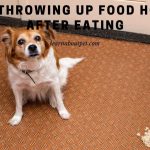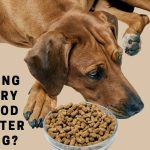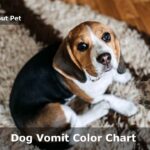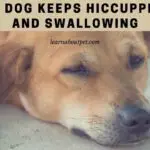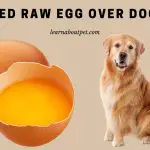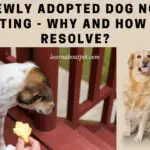It can be alarming to notice that your dog is just swallowing up his food without chewing it. It can be particularly bad where this behavior makes the dog keep on throwing up. But even where the dog doesn’t puke, his simply swallowing food without chewing can be cause for concern.
If my dog doesn’t chew his food, what are the implications? Well, for one, if the dog doesn’t chew his food, chances of him throwing up are quite high. The dog could also choke or suffer from a twisted stomach. The solution to this problem lies in getting the dog to eat at a slower pace, and thus encourage him to chew more. A simple but effective strategy you can use to this end is that of changing the dog’s feeding bowl.
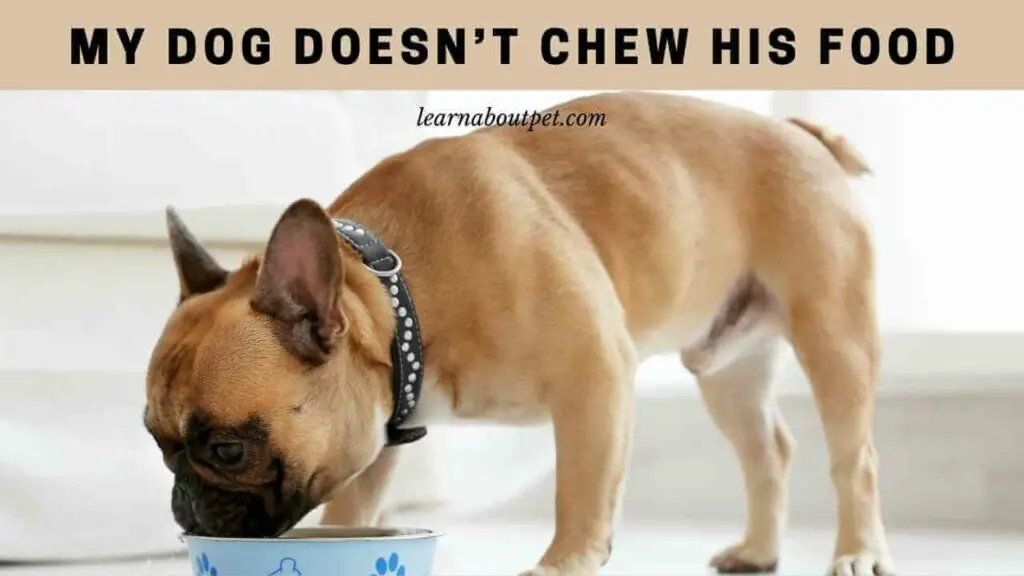
You may also consider switching from dry food to wet food. Where you have to use dry food, consider moistening it a bit. Further, ensure that the environment in which you feed your dog is calm, and the dog doesn’t feel as if he is at risk of losing his food if he doesn’t wolf it down fast enough. Consider feeding your dog on bigger kibbles that encourage chewing as well.
Read on, to find out what is causing your dog not to chew his food, how bad it is, and what you can do about it.
My Dog Doesn’t Chew His Food – Why?
Upon noticing that my dog doesn’t chew his food, the first question I am likely to have is as to what is causing this behavior. It is important to first point out that dogs are by nature fast feeders. In the wild, they live in packs: where survival often depends on how fast one is able to feed. Thus dogs aren’t really designed to slowly savor their food.
In the wild, if a dog decides to chew and eat slowly, he will probably end up starving. Food competition in dog packs is very real.
In the domestic setting, if my dog doesn’t chew his food, my first instinct would be to review his feeding environment. If the dog is in an environment where he feels that he will lose his food if he doesn’t eat it fast enough, it can lead him to eat fast without chewing.
Another consideration I would make, if my dog doesn’t chew his food, would be on the type of food he is getting. For instance, if it is dry food, the dog may just want to swallow it up because chewing it is too much work.
How you present the food to the dog may also cause him not to chew. For instance, if you present the food in a narrow bowl (with several layers of food on top of each other) the dog may be inclined to eat very fast, without chewing.
He would be trying to wolf up the top layers in order to access the ones below. Further, if the food is in the form of very small kibbles, the dog may not see the need to chew them.
The dog may also be having dental problems, which make it impossible for him to chew.
My Dog Doesn’t Chew His food And Throws Up
If your dog doesn’t chew his food and throws up, it is cause for concern – especially if it keeps on happening. It means that the dog is swallowing up pieces of food that are too big to be digested. So he just ends up throwing them up. On your end, it of course means having to clean up dog puke: which can be a rather unpleasant task.
The first step towards solving this problem is to figure out why the dog isn’t chewing his food (which is in turn leading him to throw up). Could it be on account of the type of food you are feeding him? Could it be due to the environment in which you are feeding the dog? Or could it be on account of the type of bowl you are feeding the bowl in?
Where it is on account of the type of food you are feeding him, consider making a switch. For instance, if you have been using dry food, switch to wet food.
Where it is due to the feeding environment, consider making modifications to encourage slower feeding. For instance, ensure that there is nothing in the environment that the dog could perceive as a threat to his food. If you have several dogs, consider feeding each individually.
And where it is due to the type of feeding bowl you are using, consider making a switch. For instance, switch from a narrow feeding bowl to one that is broad. Also consider investing in one of the dog slow feeder bowls (or puzzle bowls) that are available in the market. And ensure that you present the food on a somewhat raised level, rather than on the ground level.
What Happens If My Dog Doesn’t Chew His Food?
Several things can happen, if your dog doesn’t chew his food. Not chewing the food may lead to throwing up. This presents a horror to both you and the dog. To the dog, puking is never a pleasant experience – it always looks so painful. And to you, it means having to clean dog puke, which is quite a task. Moreover, if the dog is throwing up most of the food he is eating, he is at risk of malnutrition.
Further, not chewing his food puts the dog at risk of choking.
Worse still, in the process of wolfing food without swallowing, the dog may end up taking in excessive amounts of fluid, air and food. This may cause the stomach to expand and twist: a condition called Gastric Dilation Volvulus (GVD), which is potentially fatal.
Chewing aids in digestion. Therefore, the fact that your dog is swallowing food without chewing it may mean that he is not benefiting from the food fully (in nutritional terms).
Therefore, as you will see if you check any dog doesn’t chew food Reddit thread, the whole thing can be cause for concern.
How Come My Dog Doesn’t Chew His Food?
There are four key possible reasons for your dog not chewing his food.
Firstly, the dog may be in an environment where he feels that he will lose the food if he doesn’t eat it fast enough. This is one of the considerations I would look at if my dog doesn’t chew his treats (or any other food items he is presented with). So the dog feels that he risks losing the food if he doesn’t eat it fast enough. He therefore opts to just swallow it without chewing.
Secondly, the type of food you are giving the dog may be making him opt to just swallow without chewing. This may be the case if you are mainly feeding the dog on dry food, without moistening it.
Thirdly, the type of bowl you are feeding the dog in may be encouraging him to eat fast, without chewing. A bowl that is narrow, in which the food has to be set up on several layers (on top of each other) may be culprit. Or it may be a bowl that makes noise as the dog eats, exciting him to eat fast without chewing.
Fourthly, your dog may be having dental problems that make it hard for him not to chew his food. This is one of the possibilities to consider in the case of an older dog not chewing food.

Is It Bad That My Dog Doesn’t Chew His Food?
Upon noticing that my dog doesn’t chew his food, the key concern I am likely to have is as to whether it is bad. So, is it bad if my dog doesn’t chew his food? Well, much depends on the severity (and frequency) of the problem.
If, for instance, my dog doesn’t chew her food then throws up, then it would obviously be an unpleasant thing. Similarly, if my puppy doesn’t chew food throws up, it would be an unpleasant thing.
It is generally not a good thing for your dog to be swallowing his food without chewing. It may cause him to throw up (which is quite a horror). Or it may put him at risk of choking. Further, not chewing may mean the dog doesn’t fully benefit nutritionally (because chewing aids in digestion). And it could put the dog at risk of twisting his stomach, in a condition called gastric dilation volvulus.
If I had a situation where my dog doesn’t chew toys, it wouldn’t really cause me too much alarm. But a situation where your dog doesn’t chew his food (and therefore keeps on throwing it up) is real cause for concern. In the worse or more persistent cases, it may be reason enough to book a vet appointment.
Therefore in the final analysis, it is bad that your dog doesn’t chew his food. Upon discovering such a state of affairs, my focus would be in figuring out how to get my dog to chew his food. Thankfully, there are several things you can do, if your dog doesn’t chew his food, in order to encourage chewing.
What To Do When Your Dog Doesn’t Chew His Food
There is one key question that you are likely to have, upon noticing that your dog doesn’t chew his food. That question is: what do I do if my dog doesn’t chew his food? And a good starting point would be in trying to find out why my dog doesn’t chew his food.
For instance, is the food too dry? Or does the dog feel that he will lose the food if he doesn’t wolf it down fast enough? Is the food in the form of kibbles that are too small for chewing.
Once you understand why the dog doesn’t chew his food, you will be in a better position to encourage chewing. In most cases, it boils down to getting the dog to eat slower. This may be through the use of slow feeder bowls for dogs. Or it may be through the use of wet food (rather than dry dog food).
It may also be through setting up a calmer feeding environment, in which the dog doesn’t feel that he is at risk of losing the food if he doesn’t eat fast enough.
Is It Okay If My Dog Doesn’t Chew His Food?
It is really not okay if your dog doesn’t chew his food. Swallowing food without chewing puts him at risk of choking. It also increases the probability of him throwing up the food. Even where he doesn’t choke or throw up, he may not benefit fully from the food nutritionally. That is because chewing aids in digestion.
And in the worst case scenario, it could cause your dog’s stomach to expand and twist. That is in a painful (and often tragic) condition called gastric dilation volvulus.
Upon learning that it is not okay, you may ask: so what if my dog doesn’t chew his food? What is the way forward? And the answer is that you need to adopt a two-pronged approach. First figure out why the dog isn’t chewing his food. Then put in place strategies to encourage slower eating and chewing.
All in all, it is not okay that your dog doesn’t chew his food.
How Come My Dog Eats Slow But Doesn’t Chew?
Most of the advice given to people whose dogs aren’t chewing their food properly revolves around encouraging slower eating. But what if you have a situation where your dog eats slow, but doesn’t chew? In that case, there may be something wrong with the dog’s teeth.
Or there may be some other problem in the dog’s mouth, which makes it hard for him to chew, in spite of eating slowly. This is one of those cases where it is most ideal to book an appointment with your vet.
Final Verdict – My Dog Doesn’t Chew His Food
As we have seen, a dog not chewing his food can be potentially risky. It increases the chances of him throwing up. It puts him at risk of choking. And it could even cause him to suffer gastric dilation volvulus, which is often a fatal condition.
The dog not chewing his food may be a result of insecurity: where the dog feels that he is at risk of losing the food if he doesn’t wolf it down fast enough. It can also be due to the nature of the food or due to the bowl in which the food is presented.

In most cases, all you have to do is encourage the dog to eat slower, which will in turn force him to start chewing. This you can do by changing the environment in which you feed the dog. Or by changing the bowl in which you feed the dog.
It can also be about simply changing the type of food you give to the dog. Where the problem persists or becomes too frequent, it may be a good idea to take the dog to the vet.

Welcome to Learn About Pet. My name is Rajkumar Ravichandran and I love all pets, travel, and amazing food. I write about my passion and personal experience caring for multiple pets in this blog! ❤️
Post Disclaimer
DISCLAIMER: THIS BLOG OR WEBSITE, "Learn About Pet", DOES NOT PROVIDE YOU WITH MEDICAL ADVICE AND IS NOT A SUBSTITUTE FOR MEDICAL ADVICE. ALWAYS GET IN TOUCH WITH YOUR PERSONAL VETERINARIAN AND USE INFORMATION HERE AS GENERAL ADVICE.
The information, including but not limited to, text, graphics, images and other material contained on this website are for informational purposes only. No material on this site is intended to be a substitute for professional veterinary advice, food recommendation, diagnosis, or treatment. Always seek the advice of your veterinarian or other qualified health care provider with any questions you may have regarding a medical condition or for pet food related questions.
